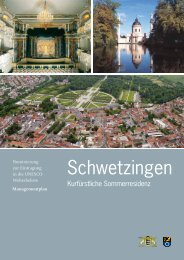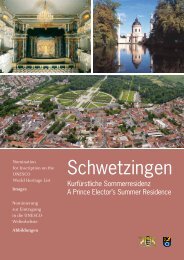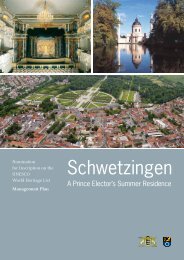II. - Schloss Schwetzingen
II. - Schloss Schwetzingen
II. - Schloss Schwetzingen
You also want an ePaper? Increase the reach of your titles
YUMPU automatically turns print PDFs into web optimized ePapers that Google loves.
condemned Catholicism as “cursed idolatry”,<br />
served as a pretext for moving the capital of<br />
the electorate to Mannheim in 1720. During<br />
the subsequent half-century, not only Mannheim<br />
was enlarged and beautifi ed with the<br />
enormously big electoral palace and various<br />
government buildings, aristocratic houses and<br />
grand Catholic churches. The new Catholic<br />
aristocracy also turned the countryside around<br />
the new residence into an area “studded”<br />
with smaller and bigger aristocratic countryhouses,<br />
and the electoral family not only used<br />
<strong>Schwetzingen</strong> as their summer-palace, but<br />
also built another big palace at Oggersheim<br />
just beyond the Rhine, destroyed in 1794, and<br />
several other country-houses and huntinglodges<br />
nearby. Thus, baroque splendour and<br />
refi ned tastes spread across the heartland of<br />
the electorate.<br />
The second half of the 18th century, however,<br />
saw the spread of a different movement 4 .<br />
Among the ruling elite, the infl uence of “the<br />
spirit of the age” began to be felt. Even in such<br />
a comparatively small state as the Palatinate,<br />
which, apart from Mannheim, could not boast<br />
of any bigger town, a new generation of upper-<br />
and middle-class people infl uenced by the<br />
Enlightenment, had grown up. Many of them<br />
presented their ideas to the Elector: Catholic<br />
clergymen wanted to promote reform in the<br />
Church and to fi ght “superstition”, well-read<br />
farmers advocated agricultural improvements,<br />
both aristocratic and bourgeois civil servants<br />
from all tiers of government, proposed a<br />
rationally structured, well-governed body<br />
politic, teachers hoped for better educational<br />
establishments, legal experts wanted to<br />
abolish the “dark” statute-books and confused<br />
judicial system and replace them with just<br />
and rational creations.<br />
The young Elector, Carl Theodor, intelligent<br />
and well-read, proved quite accessible to<br />
modern ideas. This mirrored a European trend<br />
– the increasing infl uence of enlightened<br />
4 For Carles Theodore’s reign: Stefan Mörz, “The Palatinate. The<br />
Elector and the mermaid”, in: German History. The Journal of<br />
the German History Society, Vol. 20, Number 3 (Special Issue:<br />
Imperial Principalities on the Eve of Revolution: The Lay<br />
Electorates), London 2002, pp. 332-353.<br />
<strong>II</strong>I. <strong>Schwetzingen</strong> – Historical Context<br />
ideas on practical governance in many states.<br />
Apparently, the Elector was driven by a<br />
mixture of motives: genuine interest, a strong<br />
desire to be praised by the contemporary<br />
“philosophes”, and the realization that quite a<br />
few of the intended reforms could consolidate<br />
his power base. Carl Theodor was ready to<br />
take up a lot of the projects suggested to him,<br />
so much so that in the mid-1770s, government<br />
offi cials complained that so many important<br />
reforms were being discussed at the same<br />
time, that they were completely overburdened.<br />
From the rotation of crops to the abolition of<br />
torture, many improvements were discussed<br />
and partly implemented.<br />
However, the Elector’s “enlightened” impulses<br />
were constantly at war with his traditional Catholic<br />
upbringing, and the staunchly absolutist<br />
creeds he had been taught by his relatives and<br />
his tutors. Carl Theodor grew up to become<br />
a sceptic – sceptical of tradition, but also<br />
sceptical of the lure of “the spirit of the age”:<br />
While he called a “Life of the Saints” a “bunch<br />
of lies” 5 , he also compared the age of enlightenment<br />
to a mermaid with an attractive head<br />
but a terrible fi sh-tail. 6 He received Voltaire at<br />
<strong>Schwetzingen</strong> and paid generous tribute to his<br />
anti-clerical and even anti-Christian plays, but<br />
also gave shelter to the conservative jesuits<br />
driven out of France by Louis XV.<br />
In 1777, Carl Theodor became Elector of Bavaria,<br />
after the death of the last male member of<br />
the Bavarian branch of the Wittelsbach family.<br />
The treaty of mutual succession obliged him<br />
to reside in Munich. Count Oberndorf (1720-<br />
1799), a minister of the Elector, who enjoyed<br />
his particular confi dence, was appointed<br />
stadholder of the Palatinate with far-reaching<br />
competences. The Mannheimers were deeply<br />
shocked by their master‘s departure. One<br />
night, returning from the theatre shortly<br />
before he left for Munich, the Elector and his<br />
wife were besieged in their coach by desperate<br />
people who, with tears and cries, beseeched<br />
them not to leave them and lamented their<br />
5 Recounted by the librarian Jung (Traitteur papers, Wittelsbach<br />
family archive (GHAM Munich, Corr. 882 Vg).<br />
6 Karl Theodor to Voltaire, Jan 12, 1757, in: Voltaire, Correspondence,<br />
ed. Theodore Bessel, Geneva 1953 ff., no. 7116.<br />
<strong>II</strong>I.<br />
89






